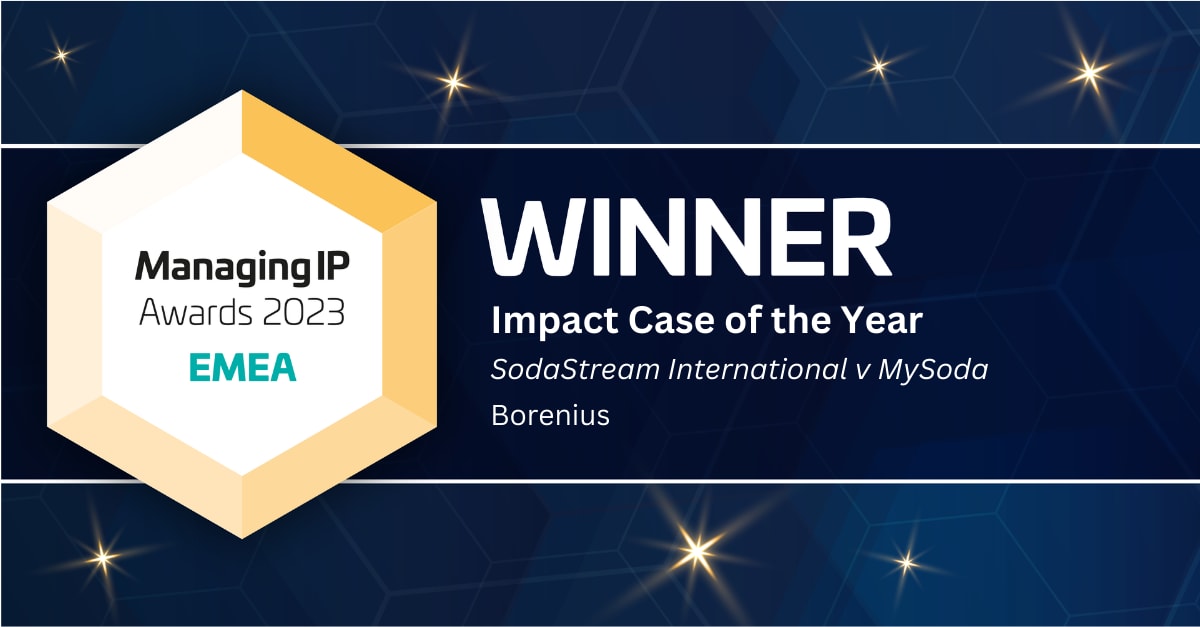Legal Alerts/12 Dec 2022
New Trademark Ruling by the Court of Justice of the European Union Brings Clarification to Trademark Proprietors in Circular Economy
The Court of Justice of the European union (“Court of Justice”) handed down a noteworthy judgment in the case C-197/21 (SodaStream v. MySoda) last October. This case relates to the so-called exhaustion of trademark rights, a legal principle fully harmonized within the EU.
What makes this judgment particularly interesting is that the Court of Justice clarifies the trademark proprietor’s legitimate reasons to oppose further commercialisation of its branded goods even in the situation where the trademark proprietor’s exclusive trademark rights would have been consumed and the principle of exhaustion would be applied.
The judgment also provides long waited guidance on resolving the tensions between the interests of a trademark proprietor and the interests of a reseller of goods that are intended to be reused several times. Although the case concerns specific products, namely refilled CO2 gas cylinders, the judgment also has wider implications for circular economy in consumer market, as it offers valuable clarifications on situations where a trademark proprietor has legitimate reasons to oppose further commercialisation of reusable goods regardless of exhaustion of exclusive trademark rights.
Background – What events preceded the judgment?
Exhaustion of trademark rights is an established principle, according to which a trademark proprietor cannot prohibit the use of a trademark in relation to goods which have been put on the market in the EU (or EEA) by the trademark proprietor or with his consent. It has also been for a long time a significant and debated legal topic in Europe, as it constitutes a limitation to the trademark proprietor’s exclusive rights and thus impacts many business activities within European Union.
The principle is not, however, without exceptions, as the exhaustion of rights does not apply if the trademark proprietor has legitimate reasons to oppose further commercialisation of the goods. These legitimate reasons were at the heart of the trademark dispute that was tried before the Market Court in Finland and that led in the appeal proceedings before the Finnish Supreme Court and finally to a referral of the case on 9 March 2021 to the Court of Justice. Legitimate reasons for opposing further commercialisation of the goods are not exhaustively listed in applicable legislation nor case law and they are, thus, subject to interpretation.
The dispute between SodaStream and MySoda began in the Finnish Market Court in 2017, when SodaStream requested the Market Court to confirm that MySoda’s conduct, where it refills SodaStream’s trademarked gas cylinders, removes the original labels equipped with SodaStream’s trademarks and affixes its own labels to the cylinders but leaves SodaStream’s trademarks engraved on the neck and bottom of the cylinders visible, infringes SodaStream’s trademark rights.
The Market Court handed down its judgment in the matter on 5 September 2019 partly accepting and partly rejecting SodaStream’s infringement action, and both parties appealed the decision to the Supreme Court. In spring 2021, the Supreme Court decided to refer the case to the Court of Justice.
The Advocate General’s Opinion in the case was published on 12 May 2022 and the Court of Justice decided the case without an oral hearing. The Supreme Court referred in total four questions for a preliminary ruling, but the Court of Justice decided to examine the four questions together and gave one answer covering all the referred questions.

Key findings of the judgement
In its judgment, the Court of Justice confirmed that under Article 15(2) of the Trademark Regulation (EU) 2017/1001, a trademark proprietor, who has marketed goods bearing its trademark that are intended to be reused and refilled several times, may oppose conduct, where a reseller refills the goods and replaces the label bearing the original trademark with other markings but leaves the original trademark visible in the said goods and subsequently markets those goods, if these new markings create a false impression among consumers that there is an economic link between the reseller and the trademark proprietor.
According to the Court of Justice, the likelihood of confusion must be assessed as a whole, taking into account:
- the information contained on the goods and their new labels,
- the distribution practices of the relevant industry, and
- the consumer’s level of knowledge of these practices.
In the judgment, the Court of Justice confirmed a number of important legal principles:
- The question of whether a trademark proprietor may oppose further commercialisation of the goods must be examined in light of the legitimate interests of the trademark proprietor and, in particular, the interest of protecting the trademark’s central function as a guarantee of the product’s origin.
- When assessing whether new labels or markings attached to the goods by the reseller create a false impression of an economic link between the trademark proprietor and the reseller, attention must be paid to all the activities of the reseller as a whole, including the manner in which the goods are presented to consumers and the conditions under which the goods are sold.
According to the Court of Justice, the risk of confusion among consumers may result from the lack of direct contact with the reseller, i.e., when the goods are not sold to consumers directly by the reseller who has refilled the goods but through retail store chains, for example.
- The existence of likelihood of confusion as to origin of the goods among consumers depends on the extent and clarity of the information included in the reseller’s new labels but also on industry practices and the consumers’ perception of the said practices. In essence, it is of importance whether the consumers are aware that the goods are reused also by other operators than the original trademark proprietor.
Implications of the judgment
This judgment is important to both trademark proprietors and operators that offer circular economy solutions in the Union.
Firstly, it can be seen as strengthening trademark proprietors’ exclusive rights, as it confirms the proprietors’ right and legitimate interest to protect their brand even after the first sale of the goods in the Union. The judgment also provides important guidance on circumstances when the trademark proprietor may exercise these rights particularly in cases involving goods that are intended to be reused several times.
The judgment will also have significance for businesses operating in circular economy, as it highlights the need for the resellers of reused goods to pay attention not only to the new markings attached on the products but also to the distribution methods and sales conditions overall to ensure that consumers are not mislead as to the origin of the goods.
The trademark dispute between SodaStream and MySoda will now continue at the Supreme Court, which is set to apply the guidance given by the Court of Justice in deciding the case on the merits and to render the final judgment in the matter in the near future.
The Borenius lawyers named below are more than happy to answer any legal questions you may have regarding this judgment and its implications on your business. Please do not hesitate to contact us for more information.

The SodaStream v MySoda case handled by our successful IP team won the prestigious Impact Case of the Year award at the Managing IP EMEA Awards 2023. Read more here.
Categories
Additional information


